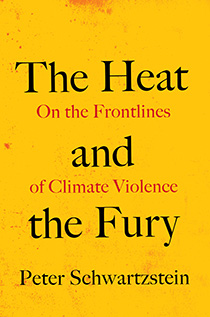"Schwartzstein’s vignettes of each troubled region are vibrantly narrated as he encounters indignant locals and has run-ins with menacing state security officials attempting to block his investigations into what they invariably consider a ‘sensitive’ subject. It’s a riveting journey through a world running hot."
Publishers Weekly, starred
"In his first book, The Heat and the Fury: On the Frontlines of Climate Violence, political correspondent Peter Schwartzstein offers a vital and riveting account of how climate change is already pulling societies apart, feeding violence across the globe."
Scientific American
"The Heat and the Fury is more than timely. The events and dynamics in its pages echo again and again on our TV screens and social media feeds…. The result is a book that will satisfy all kinds of readers, from those with only a passing familiarity with the topic to those who study it intensively."
Inkstick
"Our hotter planet is, already, a harsher and more violent one. But why? And how? And how much worse might it get? Peter Schwartzstein's The Heat and the Fury is a richly reported, beautifully rendered, remarkably complex, and rewarding meditation on the interplay of planetary instability and human brutality—a landmark work on perhaps the essential question of our time."
David Wallace-Wells, author of "The Uninhabitable Earth"
"The heat will move us. It will rearrange growing seasons and supply chains, building codes and property values, immigrant streams and national identities. And the hotter it gets, science shows, the more violent we get. Few people understand the local safety and global security implications of this like Peter Schwartzstein and even fewer have the intrepid reporting chops to take us around the world with gripping evidence and lessons learned. On an overheating Earth, where the most prepared will suffer least, this is a must-read."
Bill Weir, CNN Chief Climate Correspondent and host of "The Wonder List"
"All too often, journalists in war zones are confined to exploring the immediate violence around them. In this deeply reported book, Peter Schwartzstein does something different, investigating how climate change can not only exacerbate inequity and instability, but how it also interacts with other drivers to foment future conflict. This book is a real contribution to our understanding of the complex relationship between climate and violence."
Azmat Khan, Pulitzer Prize winner for international reporting
"At last—the red hot link between climate change and conflict laid out clearly, and laid bare. Schwartzstein has been, has seen, and tells it as it is."
Tim Marshall, author of "Prisoners of Geography"
"Fascinating. In a mammoth reporting feat, Schwartzstein takes readers across the world to the frontlines of climate change – from the villages of the Sahel to Iraq's fight against jihadis, while always making sure to include nuance and context. I learnt a huge amount from this book."
Sally Hayden, author of "My Fourth Time, We Drowned"
"Never has a book on the climate crisis been so thrilling and so rich in adventure. Beautifully written, darkly comedic in places, and with a keen ear and eye for detail…[it] carries warnings for us all of distant crises that will not be contained as the planet's climate calamity worsens."
Quentin Sommerville, BBC Middle East correspondent
"A remarkable feat of both reporting and storytelling. This book is an essential documentation of how and where we’ve gone so wrong, and yet also one that offers some hope for resolutions. Schwartzstein’s writing deftly builds to a crescendo of climate-driven conflict and instability, told with equal amounts of rigor and humanity."
Leon McCarron, author of "Wounded Tigris"

